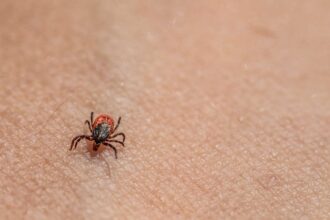Researchers at Harvard Medical School have unveiled groundbreaking insights into how the commonly found skin bacterium, Staphylococcus aureus, can directly cause itching by interacting with nerve cells. This revelation, detailed in a study published on November 22 in the journal Cell, stems from experiments conducted on mice and human cells. It significantly advances our understanding of the mechanisms behind itch, particularly in the context of widespread skin conditions such as eczema and atopic dermatitis, notorious for their persistent itching sensation.
The study highlights a disruption in the balance of skin microorganisms, which typically maintain skin health, as a precursor for the overgrowth of S. aureus. The itching associated with conditions like eczema and atopic dermatitis was traditionally attributed to skin inflammation. However, this new research indicates that S. aureus alone can trigger itching by initiating a series of molecular interactions that ultimately provoke the desire to scratch.
Isaac Chiu, the study’s senior author and an associate professor of immunology at the Blavatnik Institute at HMS, emphasizes the novelty of their findings, pointing out the direct role of the Staph aureus bacterium in causing itch. The bacterium achieves this by releasing chemicals that stimulate a protein on nerve fibres, sending itch signals from the skin to the brain. An exciting aspect of their research showed that FDA-approved anti-clotting medication could block this protein’s activation, interrupting the itch-scratch cycle, alleviating symptoms, and reducing skin damage.
These discoveries open the door to developing new oral medications and topical creams designed to combat the persistent itch associated with various conditions linked to an imbalance in the skin’s microbial community, such as atopic dermatitis, prurigo nodularis, and psoriasis. Chronic scratching, a common symptom of these conditions, can lead to significant skin damage and increased inflammation.
Liwen Deng, the study’s first author and a postdoctoral research fellow in the Chiu Lab, underscores the debilitating nature of itch in patients with chronic skin conditions, many of whom harbour the microbe now identified as a direct cause. Through their research, scientists aimed to pinpoint the exact molecular “spark plug” that ignites the itch sensation. They discovered that exposure to S. aureus intensified itching in mice, leading to severe skin damage and a heightened sensitivity to otherwise non-irritating stimuli, a phenomenon known as alloknesis, commonly observed in chronic skin condition sufferers.
The team’s investigations revealed that a bacterial enzyme called protease V8 triggered an itch by activating a specific protein called PAR1 in skin neurons. This activation leads to the transmission of itch signals to the brain. Notably, traditional itch-inducing factors like immune cells and inflammatory chemicals were not implicated in the itch caused by bacterial exposure.
The research further explored the potential of anti-clotting drugs blocking PAR1 to mitigate itch. Such drugs, already approved for human use to prevent blood clots, showed promise in reducing itching and skin damage in treated mice, suggesting a viable path for developing new anti-itch treatments.
The researchers are curious whether other microbes can also trigger itch and the evolutionary advantages this might provide to the pathogens. Speculating on the broader implications of their findings, they consider the possibility that microbes might exploit itch and other neural reflexes to facilitate their spread, highlighting an intriguing area for future investigation. This research sheds light on the complex nature of itch. It poses fundamental questions about the interactions between pathogens and their hosts, paving the way for innovative treatments and a deeper understanding of microbial behaviour.
More information: Liwen Deng et al, S. aureus drives itch and scratch-induced skin damage through a V8 protease-PAR1 axis, Cell. DOI: 10.1016/j.cell.2023.10.019
Journal information: Cell Provided by Harvard Medical School








